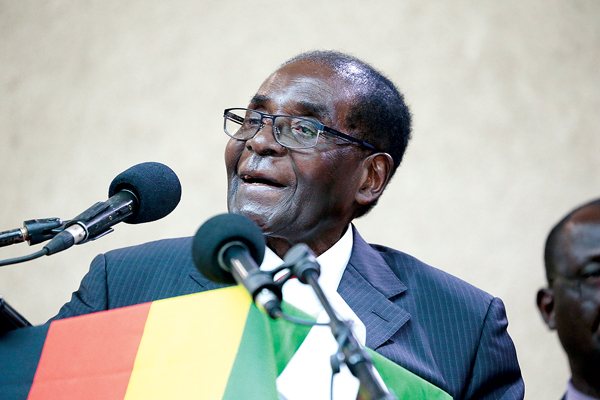
MATOBO — The remains of British imperialist Cecil John Rhodes lie under a slab of stone atop a granite hill in Zimbabwe, largely unscathed by political ferment over a man whose colonial legacy rankles many in Africa nearly a century after his death.
Associated Press
Lizards scamper around a grave that, while occasionally vandalised, attracts tourists and has been tolerated by long-time ruler President Robert Mugabe, who turned 93 last month. In this picturesque place, the burial site of a historical figure who is increasingly vilified seems secure, for now, in a country that has long accused Western powers of clinging to a colonial mindset.
Monuments to colonial rule have been removed in many countries across Africa, though some remain. There is debate over whether to erase symbols of an era of white domination on the continent or preserve them as cautionary reminders of the past.
“There are certain things in history which you must leave for posterity’s sake,” Dumiso Dabengwa, a former Home Affairs minister in Zimbabwe who is now an opposition politician, said.
“People must get to know – when they hear about Rhodes and they want to see the place where he would want to rest – and be able to make up their minds about the type of man that he was.”
Rhodes, Prime Minister of the Cape Colony at the southern tip of Africa in the late 19th Century, made a fortune in gold and diamond mining and grabbed land from the local population.
He was the namesake of territories that eventually became the nations of Zimbabwe – formerly Southern Rhodesia, then Rhodesia – and Zambia (Northern Rhodesia). Accusations that he was a racist have tainted his association with education and philanthropy.
- Chamisa under fire over US$120K donation
- Mavhunga puts DeMbare into Chibuku quarterfinals
- Pension funds bet on Cabora Bassa oilfields
- Councils defy govt fire tender directive
Keep Reading
Statues of Rhodes, who died in 1902, were uprooted in Zimbabwean cities after independence from white minority rule in 1980. He became a polarising figure again in 2015 when students defaced a statue of him at South Africa’s University of Cape Town, which removed the monument.
Last year, the University of Oxford in Britain, which allocates scholarships named after Rhodes, said it would not take down a statue of its benefactor despite protests by some students.
The Rhodes grave lies in Matobo National Park, a United Nations heritage site where granite spires and other unusual rock formations captivate visitors, and where indigenous spirits are said to dwell. The grave generates badly needed cash in a country beset by economic turmoil. A foreign adult pays $15 to get into the park, and then another $10 to see the burial site. A Zimbabwean adult pays a total of $8.
Mugabe came to this area near Bulawayo in western Zimbabwe for his birthday celebrations last month, and while officials announced that the school would be renamed after Matobo – also called Matopo or Matopos by visitors – the President joked about the British empire builder.
“Where is the ghost or spirit of Rhodes coming from?” Mugabe said in the Shona language. “If he is to rise from the dead, I am not going to order the boys to fire one bullet or use an AK47. I will order them to use a machine gun to crush that head like that of a cobra.”
Mugabe, who says he will run in elections next year, has not said where he will be buried. One strong possibility is the National Heroes Acre, a North Korean-built national monument in the capital, Harare, where independence leaders and other prominent Zimbabweans, many linked to Mugabe’s ruling party, are interred.











